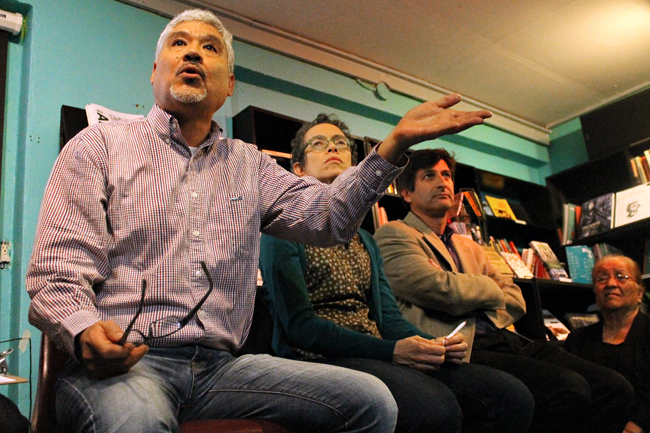Editor’s Note: The quotes in this article were originally delivered in Spanish and were translated after the event.
In reflecting on both the anniversary of the Mexican revolution and the recent outcry over the disappearance of 43 Mexican students, UT students and faculty formed part of a panel comparing the time of the Mexican revolution to the current social “revolution.”
The discussion, hosted off-campus at Monkeywrench Books, included Hector Dominguez and Gabriela Polit, associate professors in the Department of Spanish and Portuguese, and Alejandro Velez, computer science adjunct assistant professor.
According to the panelists, the disappearance of the 43 students in Ayotzinapa, Mexico, in September, and the lack of action from the government have led Mexico to what can be called a revolution.
According to Dominguez, the current main problems in Mexico are due to the drug cartels and the lack of action from the government.
“The cartels were once controlled by the government, but now they control the government,” Dominguez said.
Dominguez also said a major step society must take is to identify the drug cartels as the enemy and then solutions can be sought. Polit also agreed that there is a major confusion in terms of what should be done in Mexico and agreed that the drug cartels present the central problem is a just assessment.
Velez said the Untied Nations has repeatedly given Mexico recommendations on aiding the war against drug cartels and gaining rights for the citizens, and that none of the rulings have been implemented.
According to Velez, many Mexican citizens besides the 43 students have disappeared but how many more cannot be determined. He said Mexico has a set of priorities, and none of them deal with the rights of citizens or the formulation of protocol for disappeared students.
“We don’t know how many have disappeared because the government is too busy keeping track of how many oil barrels are exported on a daily basis,” Velez said.
Velez also said the situation with the 43 missing students provoked a social reaction throughout the Mexican nation and that this is something that could possibly define history.
“It is the social response that is shocking to everyone, and it goes to show how upset the Mexican citizens have been for years,” Velez said.
Yoalli Rodriguez, Latin American studies graduate student and event coordinator, said the social response from the international community is critical in keeping the movement alive.
“We cannot let the holiday season take attention away from the movement in Mexico,” Rodriguez said. “We are terrified that the media will stop reporting, such as it’s done before, and the government will get away with it again.”
Rodriguez, along with other UT graduate students, coordinated the event and is planning more events to involve the UT and Austin community with the Ayotzinapa social movement.





















